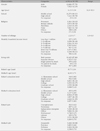Abstract
Purpose
The purpose of this study was to explore status and relationships of anger and its expression type to biopsychosocial health in Korean adolescents.
Methods
This cross-sectional study used four reliable survey questionnaires that measure anger, depression, resilience, and psychosomatic symptoms. Data were collected from 18,752 students of 36 middle schools and 23 high schools located in 23 administrative districts in Seoul, Korea.
Results
The Korean adolescents who completed the questionnaires indicated moderate level of trait anger. 45% of them demonstrated using one of three undesirable types of anger expression such as dysfunctional anger-in and anger-out, high level anger-in, or high level anger-out. Also, level of trait anger and types of anger expression were significantly associated with resilience, depression, and psychosomatic health status.
Figures and Tables
References
1. Abel JL, Larkin KT, Edens JL. Women, anger, and cardiovascular responses to stress. J Psychosom Res. 1995; 39(3):251–259.

2. Chon KK, Hahn DU, Lee JO, Spielberg CD. Korean adaptation of the state-trait anger expression inventory: Anger and blood pressure. Korean J Health Psychol. 1997; 2:60–78.
3. Chon KK, Lee MK. Preliminary development of Korean version of CES-D. Korean J Clin Psychol. 1992; 11(1):65–75.
4. Eftekhari A, Turner AP, Larimer ME. Anger expression, coping, and substance use in adolescent offenders. Addict Behav. 2004; 29(5):1001–1008.

5. Everson SA, Goldberg DE, Kaplan GA, Julkunen J, Salonen JT. Anger expression and incident hypertension. Psychosom Med. 1998; 60(6):730–735.

6. Hong YS. The effects of the stress and psychosocial resources for adolescent suicidal behaviors. Seoul: Yonsei University;2004. Unpublished doctoral dissertation.
7. Kerby DS, Brand MW, John R. Anger types and use of cigarette smokers and smokeless tobacco among Native American adolescents. Prev Med. 2003; 37:485–491.

8. Kim HS, Kim HS. Development of instrument for measuring personality factor related to juvenile delinquency. J Korean Acad Psychiatr Ment Health Nurs. 1999; 8(1):190–201.
9. Kim SJ, Lee CS, Choi BS. A study of factors influencing increase of school resilience for the development of adolescent community mental health service model. J Korean Acad Psychiatr Ment Health Nurs. 2004; 13(3):291–303.
10. Lee KJ. Psychological characteristics of high risk group in adolescent suicide. Seoul: Catholic University of Korea;2003. Unpublished master's thesis.
11. Mueller WH, Grunbaum A, Labarthe DR. Anger expression, body fat, and blood pressure in adolescents: Project heart beat. Am J Hum Biol. 2001; 13:531–538.

12. Müller MM, Rau H, Brody S, Elbert T, Heinle H. The relationship between habitual anger coping style and serum lipid and lipoprotein concentration. Biol Psychol. 1995; 41:69–81.

13. Musante L, Treiber FA. The relationship between anger-coping styles and lifestyle behaviors in teenagers. J Adolesc Health. 2000; 27(1):63–68.

14. Ohira T, Iso H, Tanigawa T, Sankai T, Imano H, Kiyama M, et al. The relationship of anger expression with blood pressure levels and hypertension in rural and urban Japanese communities. J Hypertens. 2002; 20:21–27.

15. Park ES, Park YJ, Ryu HS, Han KS, Hwang RI, Lim YJ, et al. A Nationwide survey on current conditions of school health education. J Korean Acad Nurs. 2006; 36(2):381–388.

16. Park YJ, Han KS, Shin H, Kang HC, Moon SH. Prediction on the negative outcomes of anger in female adolescents. J Korean Acad Nurs. 2004; 34(7):1234–1242.

17. Porter LS, Stone AA, Schwartz J. Anger expression and ambulatory blood pressure: A comparison of state and trait measures. Psychosom Med. 1999; 61(4):454–463.
18. Radloff LS. The CES-D scale: A self-report depression scale for research in the general population. Appl Psychol Meas. 1977; 1:385–401.
19. Raikkonen K, Matthews KA, Kuller LH. The relationship between psychological risk attributes and the metabolic syndrome in healthy women: Antecedent or consequence? Metabolism. 2002; 51(12):1573–1577.

20. Raikkonen K, Matthews KA, Sutton-Tyrrell K, Kuller LH. Trait anger and the metabolic syndrome predict progression of carotid atherosclerosis in healthy middle-aged women. Psychosom Med. 2004; 66(6):903–908.

21. Seoul Metropolitan Office of Education. Educational Statistics. 2005.
22. Siegman AW, Malkin AR, Boyle S, Vaitkus M, Barko W, Franco E. Anger and plasma lipid, lipoproteins and glucose levels in healthy women: The mediating role of physical fitness. J Behav Med. 2002; 25(1):1–16.
23. Smith TW, Ruiz JM, Gallo LC. Hostility, anger, aggressiveness, and coronary heart disease: Personality, Emotion, and Health. J Pers. 2004; 72(6):1217–1270.

24. Spielberger CD. Manual for the state-trait anger expression scale. Port Huron, MI: Sigma assessments system;1996.
25. Stoney CM, Engebretson TO. Plasma homocysteine concentrations are positively associated with hostility and anger. Life Sci. 2000; 66(23):2267–2275.

26. Suh JY. A study on the influence of parental divorce on children's adaptation: Focusing on resilience. Seoul: Yonsei University;2002. Unpublished master's thesis.
27. Williams JE, Paton CC, Siegler IC, Eigenbrodt ML, Nieto FJ, Tyroler H. Anger proneness coronary heart disease risk: Perspective analysis from the atherosclerosis risk in communities (ARIC) study. Circulation. 2000; 101:2034–2039.




 PDF
PDF ePub
ePub Citation
Citation Print
Print







 XML Download
XML Download